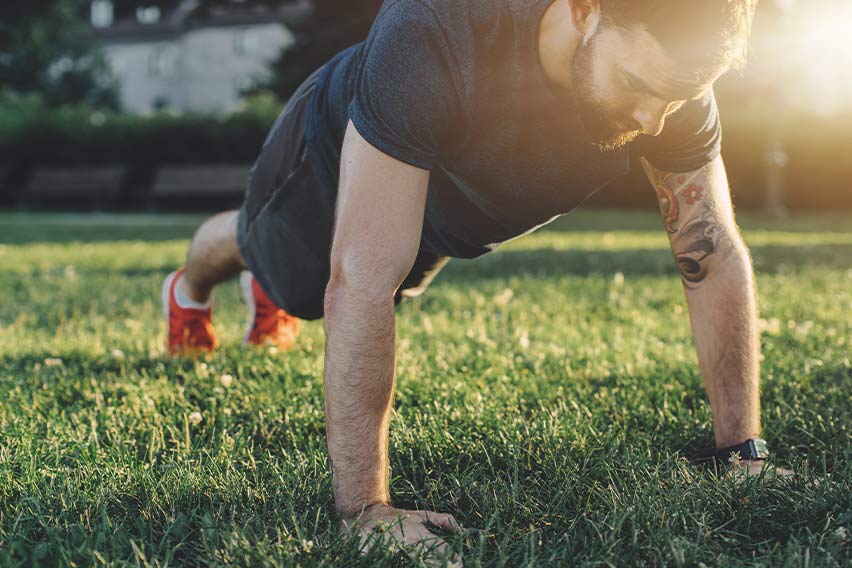Although there are many resources and tools that you can use to keep your recovery on track, exercise is easily one of the most effective. Whether you start working out while in addiction treatment or after you exit your program, fitness activities can give your life structure and balance. They’ll also give you a strong sense of accomplishment. Despite frequently being underestimated by many, exercise is a great way to stay the course and feel good about yourself while doing so. From boosting your energy levels to balancing your moods, exercise offers a diverse range of physical and mental health benefits. Best of all, exercise in recovery can be easy, low in cost, and tailored to meet your unique circumstances and needs.
Benefits of Exercising
Regular, moderate exercise is always good for your health. When people abuse drugs and alcohol, much of their general self-care falls by the wayside. Drug and alcohol users rarely prioritize healthy eating, and they often lead incredibly sedentary lifestyles. When you exercise on a routine basis, your blood pressure normalizes. Your heart and lungs work better, your mind is clearer, and you can enjoy a deeper and far more restful sleep. Exercise also:
- Strengthens your muscles and bones and prevents bone density loss
- Improves balance, flexibility, and coordination
- Releases endorphins
- Promotes weight management
- Lowers your risk of cardiovascular disease, diabetes, and many other weight-related health issues
These are benefits that you can start enjoying anytime by incorporating exercise. However, they can be especially helpful during addiction recovery.
Physical Benefits of Exercise
Quitting drugs and alcohol can have a noticeable and progressive impact on your appearance. Many addictive substances decrease blood flow, age the skin, harm the gums and teeth, and take away the hair’s lustrous shine. Drug or alcohol use may have left you heavier than you’re comfortable being, or it may have caused a significant amount of lean muscle loss. No matter how your addiction has impacted your body, sobriety sets the stage for improving how you look and feel. Over the weeks and months that follow your detox, you’ll notice positive changes from your head to your toes. By adding exercise to your recovery plan, you can expedite your body’s return to balance and good health.
Increases Your Energy
Surprisingly, even though you’ll be exerting energy while exercising, a good workout can actually leave you with greater energy reserves. This is because exercise encourages both better blood flow and better oxygen delivery. Regular exercise clears out arterial plaque caused by smoking and other unhealthy life habits. It boosts your respiratory endurance and ramps up your heart health. With exercise, you can enjoy better digestion and less digestive stress. All of these improvements and many others will leave you looking bright-eyed and feeling ready to tackle the world.
Helps With Drug and Alcohol Cravings
Engaging in activities that make you feel noticeably better and often downright unstoppable actually limits your likelihood of engaging in activities that make you feel tired, sluggish, depressed, and generally bad. Establishing a solid fitness routine in recovery places your focus on actively doing things that are good for you. This way, you aren’t spending the majority of your time focusing on what to avoid. Research shows that routine exercise can promote prolonged abstinence for people recovering from:
- Opioid addiction
- Cocaine addiction
- Methamphetamine addiction
- Cannabis addiction
- Nicotine addiction
- and more
Mental Benefits of Exercise
Exercising gives recovering addicts something to look forward to. Whether performed in a rehab setting, at a gym, or at a dance studio or other public venue, it can also have a valuable social component. As you leave treatment and start rebuilding your life and social circle, your fitness activities can put you in contact with many like-minded individuals who are committed to making their personal health a top priority. The physical benefits of exercise are progressive. While you might start your exercise plan by walking just one to two miles each day, you’ll soon find that you’re physically capable of jogging this same distance or even further. If you lift weights, being consistent in your weight training will result in the ability to perform more sets and repetitions. Not only are these gains great for your physical body, but they also promote an increased awareness of the importance of being consistent. Drug and alcohol addiction are largely hinged upon the desire for immediate gratification. A single workout performed today won’t radically change your physique tomorrow, but if you stay the course, it will produce noticeable, measurable results over time. Thus, exercise can mentally condition you to appreciate the rewards of consistent, ongoing efforts with benefits that manifest over time.
Creates Healthy Habits and Routines
Structure is a key part of keeping your recovery on track. If you have lots of free time on your hands, boredom and malaise can set your mind wandering to dangerous places. Idle hours leave you open to temptations and cravings that could be easily avoided with the right activities. Exercise is personally fulfilling, engaging, and capable of giving your life a set routine that both feels good and is good for you. It can be as easy as waking up each morning to go cycling or finishing your day with a relaxing walk. No matter how moderate or simple your workout routine is, it will help keep you focused and on track.
Helps Relieve Stress
It’s virtually impossible to stay stressed when you’re busy focusing on complex or repetitive physical movements. This is why people often go on long, leisurely walks when they need to clear their heads. When you exercise, your mind will be focused on breathing, coordinating your movements, and avoiding physical injury. Exercise is immersive, challenging, and stress-relieving. Whether you’re depressed, anxious, or angry, getting out and getting active is a great way to regain your mood balance. Moreover, with an intense workout, you’ll enjoy the benefits of an endorphin release. These mood-elevating chemicals will leave you feeling energized and uplifted long after intense physical exertion. Working out for an endorphin rush has helped countless people stave depression and other negative emotions off. In fact, if your recovery plan includes dual diagnosis treatment, exercise may be recommended as a long-term part of your ongoing management plan.
How Does Your Recovery Benefit from Exercise?
When people use drugs or alcohol for extended periods of time, they gradually condition their brains to reward unhealthy behaviors. Drugs and alcohol act on the central nervous system’s reward center. The brain’s reward center exists to motivate and encourage actions and activities that are actually good for you. For instance, when you exercise, you may get the benefit of a massive endorphin release. These “feel good” chemicals make you associate physical activity with happiness, accomplishment, and well-being.
As a result, you’re more likely to engage in physical exercise again. Unfortunately, drug or alcohol use has had the same effect on your brain. The brains of addicts associate drinking and drug use with euphoria, heightened confidence, and relaxation for quite some time. One of the best ways in which exercise can benefit your recovery is by reprogramming your brain’s reward center. Engaging in truly beneficial activities like cycling, aerobics, swimming, or jogging will help your brain relearn how to reward only those behaviors that promote increased well-being and health.
Improves Your Sense of Self-Worth
One of the most common underlying causes of addiction is low self-esteem or feelings of low self-worth. In fact, many addicts are unable to successfully recover until they recognize their own value. Without a strong sense of self-worth, you might not believe yourself worthy of getting better, or worthy of staying that way. Exercise pushes people to move past their own perceived physical boundaries. It provides measurable results for their efforts and a strong sense of accomplishment. These are benefits that gradually spill over into other life areas. Engaging in activities that visibly improve your well-being can be a real confidence booster. Best of all, you’ll also have the benefit of increased energy, better sleep hygiene, and improved mental clarity and focus. When you work out in recovery, setting goals and achieving them in any area of life becomes much easier.
Ideas to Get You Started
You don’t need an expensive gym membership, special training, or costly equipment to make exercise a regular part of your ongoing recovery plan. In fact, at Recovery Bay Center, we offer a diverse range of physical fitness activities for stress management, improved physical health, mood balance, and more. Some of the best ways to get active in recovery include:
- Practicing yoga
- Swimming
- Going for long walks
- Signing up for a dance or aerobics class
- Using your own body weight and natural resistance to train at home
Exercise in recovery can be as simple as doing a set number of squats and abdominal crunches in your bedroom or meeting up with friends to play tennis. However, to get the most benefits from exercise in recovery, you’ll need to establish a structured, goal-oriented workout plan and be consistent. If you want to learn more about the benefits of exercise in recovery, we can help. With our holistic, whole-health approach to helping patients achieve total wellness, we’re committed to making physical fitness an integral part of our addiction treatment.
Detox at Recovery Bay Center
At Recovery Bay, we’re dedicated to providing a comprehensive range of addiction services and specialized men’s addiction treatment programs. As a leading men’s addiction treatment center, we recognize the unique needs and challenges that men often face on their journey to recovery. Our tailored men’s addiction treatment programs are designed to address these factors head-on, ensuring a more effective and impactful recovery process.
Within our men’s addiction treatment programs, we understand the importance of a holistic approach. Addiction is a multifaceted issue that demands personalized solutions. Our programs, whether focusing on alcohol, drugs, or other substances, integrate evidence-based therapies, counseling sessions, and individualized treatment plans. By targeting both the physical and psychological aspects of addiction, we provide a well-rounded foundation for lasting recovery.
As a specialized men’s addiction treatment center, we emphasize the significance of fostering a supportive and empathetic environment. Our facility serves as a safe haven where men can openly share their experiences, challenges, and aspirations with peers who understand their journey intimately. This sense of camaraderie cultivates a strong sense of belonging and mutual encouragement, enhancing the overall recovery experience.
Beyond immediate treatment, our comprehensive range of addiction services extends to equipping men with the skills they need for sustainable recovery. Our men’s addiction treatment programs focus on vital aspects such as relapse prevention, stress management, and life skills development. By empowering individuals with practical tools, we ensure they are prepared to navigate the complexities of daily life with resilience.
Get in touch with us today to find out more about the services we supply or to speak with one of our admissions counselors.






